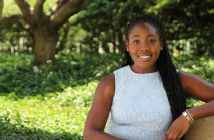A team from the Fordham Dispute Resolution Society—composed of Bianca Bernardi ’23, Phoebe Huth ’23, Alyssa Plascoff ’23, Alessandro Schooley ’23, and Paul Tsavoussis ’23—made it to the final round of this year’s American Bar Association Law Student Arbitration Competition, which took place virtually on Jan. 28 and 29.
“We are extremely proud of the work the team put into this competition,” said coach Margaret Revera ’22. “I believe their showing in the National finals illustrates how far they have come.”
The competition brought together 40 law school teams from across the country, offering students the opportunity to learn more about arbitration proceedings by “simulating a realistic arbitration hearing” and allowing them to “experience what it is to be a professional, competent, and ethical advocate,” according to the ABA.
The same group of students previously represented Fordham Law at the regional level of the 2022 ABA Law Student Arbitration Competition Nov. 19–20, besting 12 other teams and finishing first.
“I am grateful to have witnessed the team’s growth and progress over the course of the past five months and am extremely proud of all they have accomplished,” said coach Perry Zirpoli ’22.
To prepare for Nationals, the Fordham Law team held numerous moots to improve and refine their arguments. The fictional case—regarding a contested will and touching upon issues in elder law and estate law—remained the same throughout the competition, giving the student competitors ample time to carefully consider and look at all aspects of the case.
Their practice paid off as the team found themselves in the final round of competition. “That final round was by far our best,” said Bernardi. “I was so proud of everyone. I think we all were able to have a great time while also performing really well.“
“The Fordham team was impressive and skilled during the competition,” said faculty coach Deborah Masucci. “They incorporated all the tips and recommendations they received from experienced arbitrators during preparation, but also showed they were nimble, changing course based on their opponent’s arguments and witness testimony.”
All participating teams were judged on the organization and structure of their presentations, their understanding of the law, the quality of their direct and cross examinations, their interactions with witnesses, and how well they could respond to their opponents’ cases.
“This was one of the more enjoyable experiences I’ve had in law school thus far,” said Bernardi. “We had a really great team, so it made working hard even more fun. There was great communication, great teamwork, and everyone was committed and had all these creative thoughts and ideas. I think that’s part of why we did so well.”




